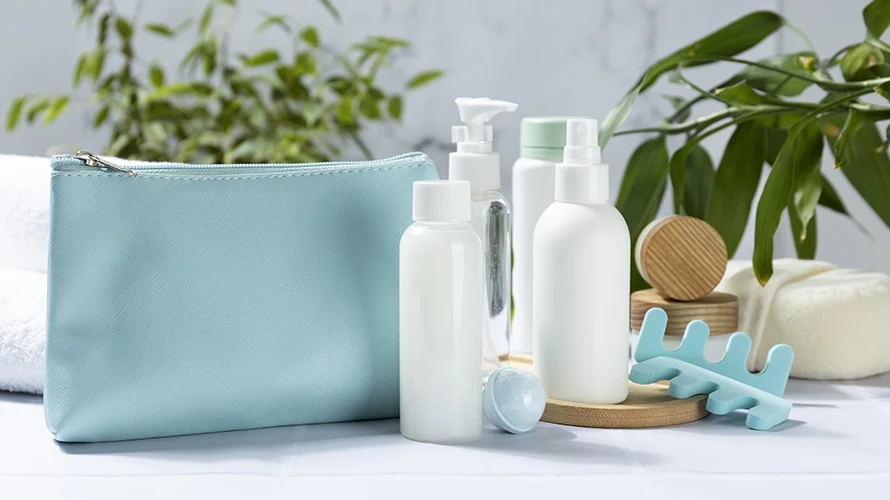The Future of Sustainable Cosmetic Packaging

Founder of UKPACK, Chief Packaging Designer with 18 years of experience, Red Dot Award Winner
Specialize in custom, innovative, and sustainable packaging solutions for cosmetics, skincare, personal care, hair care, food and beverage, and more.

Sustainability has become a significant focus of the cosmetics industry in recent years. With increasing consumer awareness and demand for eco-friendly products, cosmetics brands are exploring new ways to make their products more sustainable. One of the ways they are doing this is through sustainable packaging.
In this blog, we will examine emerging trends and technologies in sustainable cosmetics packaging and speculate on the future.
Emerging Trends in Sustainable Cosmetic Packaging
1. Refillable packaging and its advantages
Refillable packaging is gaining popularity as an alternative to traditional single-use packaging. Refillable packaging allows customers to reuse the same container multiple times by refilling it with a new product. This trend not only reduces waste but also encourages customers to become more conscious of their consumption habits.
2. Biodegradable packaging and its different types
Biodegradable packaging is another sustainable alternative to traditional packaging materials. Biodegradable packaging can be made from a variety of materials, including plant-based materials, such as cornstarch, sugarcane, or bamboo. There are different types of biodegradable packaging, such as compostable, bioplastic, and biodegradable plastic, each with its unique properties and benefits.
3. Use of recycled materials
The use of recycled materials in cosmetic packaging is another emerging trend. Recycled materials, such as post-consumer recycled plastic, can significantly reduce the environmental impact of packaging by diverting waste from landfills and reducing the need for virgin materials.
4. Packaging-free cosmetics
Packaging-free cosmetics are a new trend in sustainable cosmetics packaging. These products are sold without any packaging, such as a box or container, to reduce waste. Instead, they are often sold in solid forms, such as bars or tablets, or in reusable containers that customers can refill.
5. Reduction of packaging size
Another trend in sustainable cosmetics packaging is the reduction of packaging size. By using less material in the packaging, cosmetics brands can reduce their carbon footprint and the amount of waste generated by their products.
Emerging Technologies in Sustainable Cosmetic Packaging
1. Smart packaging and its features
Smart packaging is a new technology that allows cosmetics brands to incorporate technology into their packaging. Smart packaging can help brands track products’ freshness, monitor usage, and provide customers with additional information about the product, such as ingredients and usage instructions.
2. Use of nanotechnology for sustainable packaging
Nanotechnology is an emerging technology that can help create more sustainable packaging. Nanotechnology can be used to create more robust and durable packaging materials that are also lightweight, reducing the amount of material needed to create the package.
3. Plant-based packaging materials and their advantages
Plant-based packaging materials, such as those made from algae or mushrooms, are becoming more popular in sustainable cosmetics packaging. These materials are biodegradable, renewable, and compostable, making them a more sustainable alternative to traditional packaging materials.
4. Advanced recycling and upcycling methods
Advanced recycling and upcycling methods are new technologies that can help transform waste into new packaging materials. These methods can help reduce waste, lower greenhouse gas emissions, and conserve resources.
The Future of Sustainable Cosmetic Packaging
1. Speculation on which trends and technologies are likely to become more common in the future
It is likely that refillable packaging and biodegradable packaging will continue to grow in popularity, as well as the use of recycled materials. Plant-based packaging materials and smart packaging are also expected to become more common as the technology advances.
2. Discussion of how consumer preferences and governmental regulations may influence the direction of sustainable cosmetic packaging
Consumer preferences and governmental regulations are likely to influence the direction of sustainable cosmetic packaging in the future. As consumers become more aware of the environmental impact of packaging, they may demand more sustainable packaging options. Governmental regulations may also require companies to meet certain sustainability standards in their packaging. This could include regulations on the use of certain materials or the percentage of recycled content in packaging. As sustainability becomes more of a priority for both consumers and governments, cosmetics companies will need to adapt and innovate to meet these demands.
3. Exploration of how sustainable packaging will impact the cosmetics industry in the future
The shift towards sustainable packaging is likely to have a significant impact on the cosmetics industry in the future. Brands that prioritize sustainability will be seen as more responsible and trustworthy by consumers, potentially giving them a competitive advantage. Additionally, sustainable packaging can help brands to reduce costs and improve their bottom line. However, companies that do not prioritize sustainability may face backlash from consumers and lose market share. Overall, the cosmetics industry will need to evolve and adapt to meet the changing demands of consumers and the regulatory environment.
Conclusion
The blog post has examined emerging trends and technologies in sustainable cosmetics packaging and speculated on the future. Key trends include refillable packaging, biodegradable packaging, the use of recycled materials, and packaging-free cosmetics. Emerging technologies include smart packaging, plant-based packaging materials, and advanced recycling and upcycling methods. The future of sustainable cosmetic packaging is likely to be influenced by consumer preferences and governmental regulations, and will have a significant impact on the cosmetics industry.
Cosmetics brands have an important role to play in driving the shift towards sustainable packaging. By prioritizing sustainability, brands can improve their reputation with consumers and reduce their environmental impact. Brands should consider investing in research and development to create innovative sustainable packaging solutions, and work to reduce their overall packaging waste.
The future of sustainable cosmetic packaging is an exciting one, with many new technologies and trends emerging. However, it is important to remember that sustainable packaging is just one aspect of overall sustainability. Brands should strive to adopt a holistic approach to sustainability, encompassing their entire supply chain and operations. By doing so, they can create a more responsible and sustainable future for the cosmetics industry and the planet as a whole.
More Resources:
